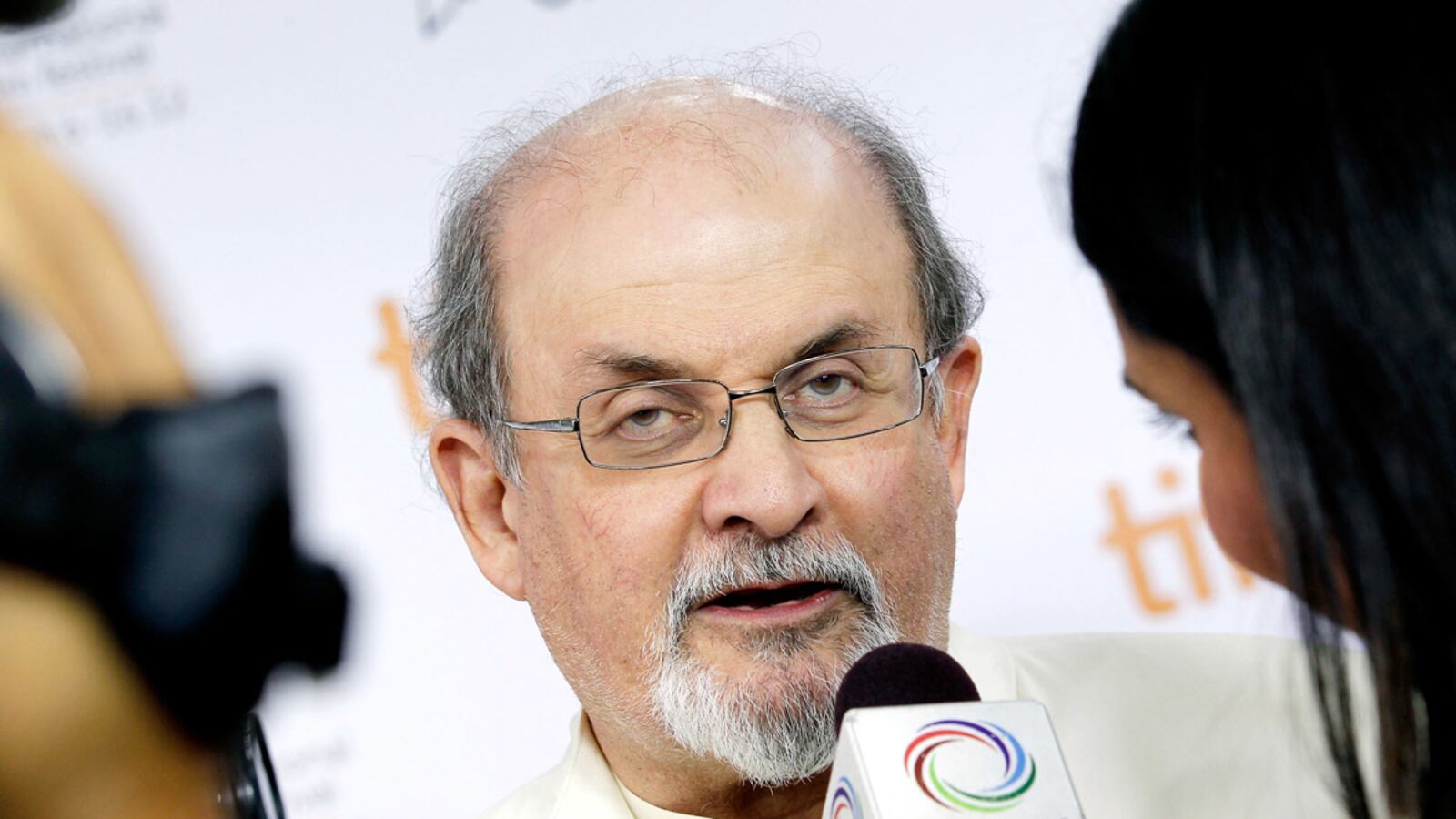When Queen Elizabeth II knighted Salman Rushdie in June 2007, an Iranian Foreign Ministry spokesman called the decision to honor the “apostate” a “blatant example” of Islamophobia.
Now, in the wake of protests across the Middle East over an obscure anti-Islam U.S. film, the religious foundation that set a bounty on the author’s head in 1989 has increased the reward by $500,000, for a new total of $3.3 million.
Rushdie has been living under police protection since 1989, when Ayatollah Ruhollah Khomeini issued a fatwa for his death following the publication of Rushdie’s 1988 book, The Satanic Verses. The 15 Khordad Foundation, created by Khomeini shortly after the 1979 revolution, put the bounty on the author’s head after the fatwa.
“To be sure, if Imam Khomeini’s fatwa had been carried out, the subsequent insults in the form of cartoons, articles, and films would not have happened,” said Hassan Sanei, head of the 15 Khordad Foundation, according to the Iranian Student News Agency. “The death sentence of Salman Rushdie, an apostate, was issued with the aim of drying up the roots of anti-Islamic conspiracies, and now it is only through this fatwa that we can neutralize the vengeful conspiracies.”
In a statement to the Los Angeles Times, Rushdie dismissed the increased bounty, saying, “I’m not inclined to magnify this ugly bit of headline grabbing by paying it much attention.”
Two days after the violent Sept. 11 protests on the U.S. Embassy in Cairo and deadly attack on the U.S. Consulate in Benghazi, Libya, Iran’s supreme leader, Ayatollah Ali Khamenei, had singled out Rushdie for blame over the anti-Islam film, Innocence of Muslims.
“The first suspects in this crime are the Zionists and the U.S. government,” said Khamenei in a statement. “If they had not supported the former links of this filthy chain, meaning Salman Rushdie, the Danish cartoonist, and the American priests who set the Quran on fire, and if they had not ordered dozens of anti-Islam films from companies related to Zionist investors, today things would not have come to this huge and unforgivable sin.”
The 15 Khordad Foundation’s decision is in complete harmony with Ayatollah Khamenei’s statements on the film and his positioning of Iran as a leader of jihad against the West, said Hassan Yousefi Eshkevari, a prominent Iranian dissident cleric.
“Iran’s leaders are trying to surpass others in the Islamic world and to ride on the wave of recent events to gain popularity and prestige for themselves among Arab nations, competing with Islamic fundamentalists in this area,” said Eshkevari, who faced “apostasy” charges and a death sentence in 2000 for criticizing Islamic laws, in a telephone interview. “Protests against Salman Rushdie’s book began in the U.K., but they engulfed Pakistan and left several dead. It was after the Pakistan events that Ayatollah Khomeini issued a fatwa, placing himself ahead of all the other Islamic leaders on the subject of Rushdie.”
But not all conservatives are in agreement on how to react to the film. Emad Afroogh, a former conservative member of Parliament who teaches sociology at Tehran University, refused to comment on Salman Rushdie but said Muslims should avoid violence when their beliefs are insulted. “A section of Western civilization tries to show a violent image of Islam and to present themselves as defenders of freedom and democracy,” he said. “As Muslims, we must not aid the capitalist system by showing violent reactions and in effect confirming the basis for the group that promotes fear of Islam.”
The cleric Eshkevari noted the varying responses to the film and its aftermath. “Leaders of Arab countries, including the grand Sunni mufti in Egypt, offered their condolences to the United States, whereas Ayatollah Khamenei directly accused the U.S. and Israel,” he said.
After the killing of U.S. Ambassador Chris Stevens and three American diplomats in Benghazi last week, Iranian government bodies organized protests in front of the American Interests Section of the Swiss Embassy in Tehran. Groups close to the Basij militia and pro-regime student groups planned similar protests during the Friday prayers in Tehran and in other cities.

The protests were marked by chants against the U.S. and Israel and flag burning. Unlike in Libya or Egypt, where protests appear to have been spontaneous or organized by religious groups, anti-American protests in Iran have been fully mobilized by government bodies such as the Basij militia force, the Organization of Islamic Propaganda, and the Friday Prayers Imam Council. All three organizations are national in scope and supervised by the supreme leader.
While newspapers close to the regime or the Revolutionary Guards covered the news surrounding the film extensively, independent and reformist-leaning newspapers largely ignored it. Every newspaper in Iran is obliged to cover whatever the supreme leader says, however, so on Saturday almost all of the Tehran papers published Ayatollah Khamenei’s remarks on the film.
In its Thursday editorial, the radical conservative newspaper Kayhan, whose editor in chief is appointed by Iran’s leader, predicted that similar events would take place in other countries, arguing that the protests by Muslims in Middle Eastern countries must not be limited to demonstrations and that Iran must use this event as an opportunity. “If in the resort region of Libya, [U.S.] recreational activities could cost the U.S. its ambassador’s life, we must ask, how much will the U.S. presence in Egypt, Bahrain, Turkey, and Saudi Arabia cost them? This equation has clear answers.”
Muslims worldwide should make sure Islam isn’t insulted again, said another conservative cleric, Ayatollah Makarem Shirazi.






